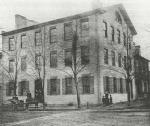![header=[Marker Text] body=[Abraham Lincoln was a guest of David Wills in this house, Nov. 18 and 19, 1863. Here he met Governor Curtin and others, greeted the public, and completed his Gettysburg Address. ] sign](kora/files/1/10/1-A-114-139-ExplorePAHistory-a0a4q3-a_450.gif)
Mouse over for marker text
Name:
Wills House
Region:
Hershey/Gettysburg/Dutch Country Region
County:
Adams
Marker Location:
SE section of Square
Dedication Date:
November 19, 1949
Behind the Marker
In 1863, David Wills was a thirty-two-year-old attorney who had studied law under Pennsylvania Congressman  Thaddeus Stevens. A local Republican leader, he was one of Gettysburg's most notable citizens.
Thaddeus Stevens. A local Republican leader, he was one of Gettysburg's most notable citizens.
In mid-July, 1863, Pennsylvania governor Andrew Curtin had visited the Gettysburg battlefield, shortly after the deadly Civil War battle. It was a somber place, still reeking with the smell of rotting corpses. There, the governor authorized Wills to organize more dignified burials for the state's fallen soldiers. Soon the idea was expanded to include participation from eighteen Union States to create a national cemetery for the Union dead.
Andrew Curtin had visited the Gettysburg battlefield, shortly after the deadly Civil War battle. It was a somber place, still reeking with the smell of rotting corpses. There, the governor authorized Wills to organize more dignified burials for the state's fallen soldiers. Soon the idea was expanded to include participation from eighteen Union States to create a national cemetery for the Union dead.
Wills organized nearly everything included in developing the cemetery. He bought the land and hired a cemetery designer. He reviewed thirty-four bids for the reburial process, choosing a firm that proposed to do the job for $1.59 per body. The industrious attorney also contacted some of the nation's leading poets, requesting special poems for the cemetery's opening. Nobody accepted. He did, however, convince renowned public speaker Edward Everett to give the principal oration. Wills was so pleased by Everett's acceptance that he agreed to delay the ceremonies so that orator could finish preparing his speech.
Although President Abraham Lincoln was likely aware of the plans for the cemetery, he did not receive an official invitation to attend its dedication until November 2, 1863, and then only to present "a few appropriate remarks." The night before the event, Lincoln shared dinner with Wills and other guests, interrupting the meal to wave to the crowds gathered outside. He also nervously read telegrams informing him about the state of his son Tad's illness. He then retired upstairs, reportedly to spend time revising his brief remarks for the next day.
In mid-July, 1863, Pennsylvania governor
Wills organized nearly everything included in developing the cemetery. He bought the land and hired a cemetery designer. He reviewed thirty-four bids for the reburial process, choosing a firm that proposed to do the job for $1.59 per body. The industrious attorney also contacted some of the nation's leading poets, requesting special poems for the cemetery's opening. Nobody accepted. He did, however, convince renowned public speaker Edward Everett to give the principal oration. Wills was so pleased by Everett's acceptance that he agreed to delay the ceremonies so that orator could finish preparing his speech.
Although President Abraham Lincoln was likely aware of the plans for the cemetery, he did not receive an official invitation to attend its dedication until November 2, 1863, and then only to present "a few appropriate remarks." The night before the event, Lincoln shared dinner with Wills and other guests, interrupting the meal to wave to the crowds gathered outside. He also nervously read telegrams informing him about the state of his son Tad's illness. He then retired upstairs, reportedly to spend time revising his brief remarks for the next day.





